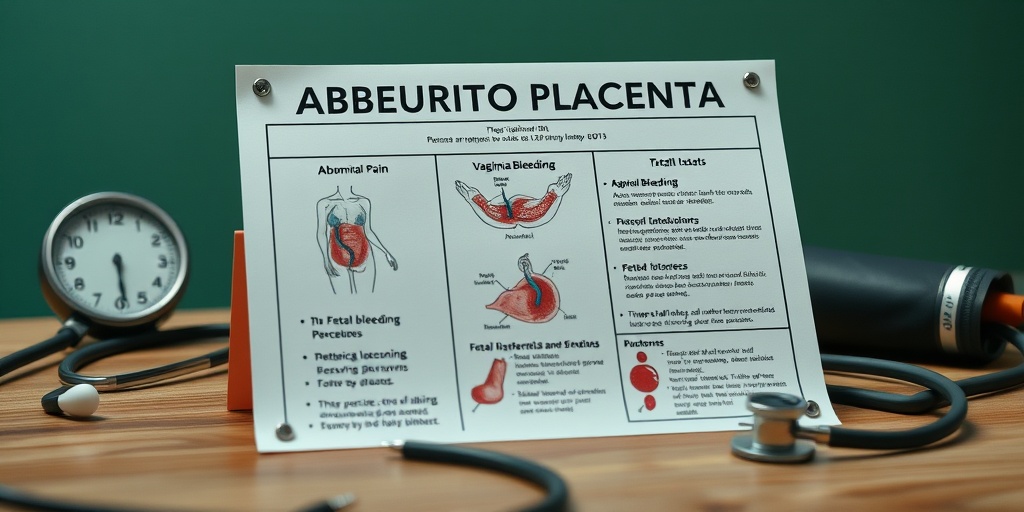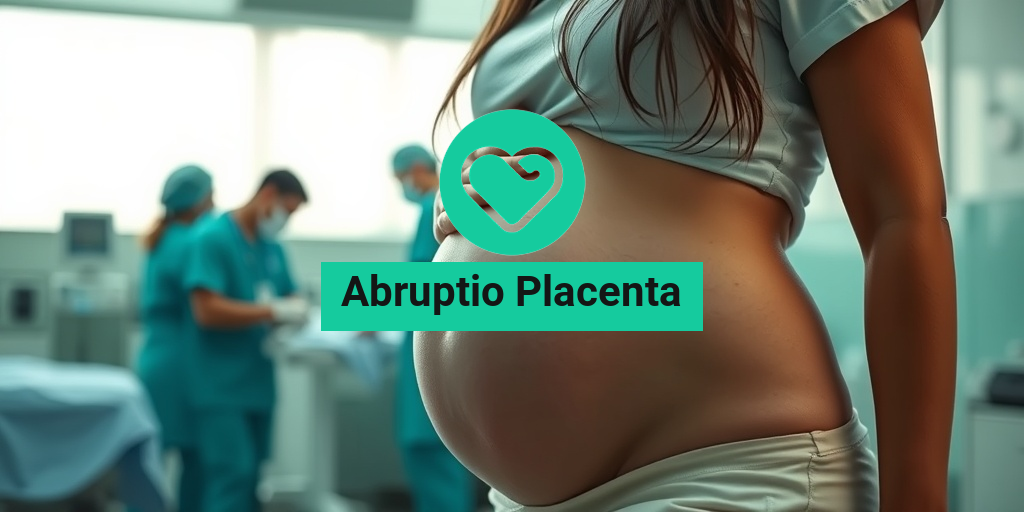What Is Abruptio Placenta?
Abruptio placenta, also known as placental abruption, is a serious pregnancy complication that occurs when the placenta detaches from the uterus before childbirth. This condition can lead to significant health risks for both the mother and the baby, making it crucial for expectant mothers to understand its implications.
Understanding the Placenta
The placenta is a vital organ that develops in the uterus during pregnancy. It provides oxygen and nutrients to the growing fetus and removes waste products from the baby’s blood. A healthy placenta is essential for a successful pregnancy, and any disruption can have serious consequences.
Types of Abruptio Placenta
Abruptio placenta can be classified into different types based on the severity and extent of the detachment:
- Partial Abruption: Only a portion of the placenta separates from the uterine wall.
- Complete Abruption: The entire placenta detaches, which poses a greater risk to both mother and baby.
Causes of Abruptio Placenta
While the exact cause of abruptio placenta is not always clear, several factors can increase the risk:
- High Blood Pressure: Chronic hypertension or pregnancy-induced hypertension can lead to placental issues.
- Trauma: Physical injury to the abdomen, such as from a fall or car accident, can trigger abruption.
- Smoking and Substance Abuse: These behaviors are linked to a higher risk of placental complications.
- Multiple Pregnancies: Women carrying twins or more are at increased risk.
Abruptio Placenta Symptoms
Recognizing the symptoms of abruptio placenta is vital for timely medical intervention. Here are the key signs to watch for:
Common Symptoms
- Vaginal Bleeding: This is often the most noticeable symptom. The bleeding can range from light spotting to heavy bleeding.
- Abdominal Pain: Severe pain in the abdomen or lower back is common and may be accompanied by cramping.
- Uterine Contractions: Frequent contractions or a hardening of the uterus can indicate a problem.
- Fetal Movement Changes: A noticeable decrease in the baby’s movements may signal distress.
When to Seek Medical Help
If you experience any of the symptoms mentioned above, it is crucial to seek medical attention immediately. Early diagnosis and management can significantly improve outcomes for both mother and baby. Remember, timely intervention is key in managing abruptio placenta.
Management and Treatment
The management of abruptio placenta depends on the severity of the condition and the gestational age of the fetus. Treatment options may include:
- Monitoring: In mild cases, close monitoring may be all that is needed.
- Hospitalization: Severe cases often require hospitalization for observation and treatment.
- Delivery: If the abruption is severe or the baby is in distress, early delivery may be necessary.
For more detailed information and resources on managing abruptio placenta, consider visiting Yesil Health AI, where you can find evidence-based health answers tailored to your needs.
In conclusion, understanding abruptio placenta is essential for expectant mothers. By being aware of the symptoms and risks, you can take proactive steps to ensure a healthier pregnancy. Stay informed, and don’t hesitate to reach out to your healthcare provider with any concerns. Your health and your baby’s health are paramount! 🌼

Abruptio Placenta Causes
Abruptio placenta, also known as placental abruption, is a serious condition that occurs when the placenta detaches from the uterus before childbirth. Understanding the causes of this condition is crucial for expectant mothers and healthcare providers alike. Here are some of the primary factors that can lead to abruptio placenta:
1. Trauma or Injury
One of the most common causes of abruptio placenta is trauma to the abdomen. This can occur due to:
- Car accidents 🚗
- Falls
- Physical abuse
Such injuries can disrupt the attachment of the placenta to the uterine wall, leading to premature separation.
2. High Blood Pressure
Women with hypertension or preeclampsia are at a higher risk for abruptio placenta. High blood pressure can affect the blood vessels in the placenta, making it more susceptible to detachment.
3. Smoking and Substance Abuse
Smoking during pregnancy is linked to various complications, including abruptio placenta. Additionally, the use of illicit drugs, such as cocaine, can significantly increase the risk due to their effects on blood vessels and uterine contractions.
4. Multiple Pregnancies
Carrying more than one fetus (twins, triplets, etc.) can put extra strain on the uterus and increase the likelihood of placental abruption. The increased size and pressure can lead to complications, including abruptio placenta.
5. Previous History of Abruptio Placenta
Women who have experienced abruptio placenta in previous pregnancies are at a higher risk of it occurring again. This history can indicate underlying issues that may predispose them to similar complications in future pregnancies.
6. Uterine Abnormalities
Structural abnormalities in the uterus, such as fibroids or a septate uterus, can interfere with the normal attachment of the placenta, increasing the risk of detachment.
7. Infections
Certain infections during pregnancy, particularly those affecting the uterus, can contribute to the risk of abruptio placenta. Infections can lead to inflammation and compromise the integrity of the placental attachment.
Abruptio Placenta Risk Factors
In addition to the causes, several risk factors can increase the likelihood of experiencing abruptio placenta. Understanding these factors can help in monitoring and managing potential complications during pregnancy.
1. Maternal Age
Women over the age of 35 are at a higher risk for abruptio placenta. As maternal age increases, the likelihood of complications during pregnancy also rises.
2. Previous Pregnancy Complications
Women who have had complications in previous pregnancies, such as abruptio placenta or other placental issues, may be more susceptible to similar problems in subsequent pregnancies.
3. Chronic Health Conditions
Conditions such as diabetes, hypertension, and clotting disorders can increase the risk of abruptio placenta. These health issues can affect blood flow and the overall health of the placenta.
4. Poor Nutrition
A lack of essential nutrients during pregnancy can weaken the placenta and increase the risk of detachment. Proper nutrition is vital for maintaining a healthy pregnancy and reducing risks.
5. Stress
High levels of stress can have a negative impact on pregnancy. Chronic stress may lead to increased blood pressure and other complications that can contribute to abruptio placenta.
6. Lifestyle Choices
Unhealthy lifestyle choices, such as smoking, excessive alcohol consumption, and drug use, can significantly increase the risk of abruptio placenta. Making healthier choices can help mitigate these risks.
7. Lack of Prenatal Care
Regular prenatal check-ups are essential for monitoring the health of both the mother and the baby. Women who do not receive adequate prenatal care may be at a higher risk for complications, including abruptio placenta.
Understanding the causes and risk factors associated with abruptio placenta is crucial for expectant mothers. By being aware of these elements, women can take proactive steps to ensure a healthier pregnancy and reduce the likelihood of complications. 🌼

Abruptio Placenta Diagnosis
Abruptio placenta, also known as placental abruption, is a serious condition that occurs when the placenta detaches from the uterus before childbirth. This can lead to significant complications for both the mother and the baby. Early diagnosis is crucial for effective management and treatment. Here’s how healthcare providers typically diagnose this condition.
Signs and Symptoms
The first step in diagnosing abruptio placenta is recognizing the signs and symptoms. Common indicators include:
- Vaginal bleeding: This can range from light spotting to heavy bleeding.
- Abdominal pain: Women may experience sudden, severe pain in the abdomen or lower back.
- Uterine contractions: Frequent contractions may occur, often accompanied by tenderness.
- Fetal distress: Changes in the baby’s heart rate can indicate complications.
Medical Evaluation
If a woman presents with symptoms suggestive of abruptio placenta, a healthcare provider will conduct a thorough medical evaluation. This typically includes:
- Physical examination: The doctor will assess the abdomen for tenderness and check for signs of bleeding.
- Ultrasound: An ultrasound may be performed to visualize the placenta and assess the extent of the detachment.
- Fetal monitoring: Continuous monitoring of the baby’s heart rate helps determine if the fetus is in distress.
Laboratory Tests
In some cases, laboratory tests may be ordered to evaluate the mother’s blood type and hemoglobin levels, especially if there is significant bleeding. These tests help in planning for potential interventions.
Abruptio Placenta Treatment Options
Once diagnosed, the treatment for abruptio placenta depends on several factors, including the severity of the condition, the gestational age of the fetus, and the overall health of the mother. Here are the primary treatment options:
Observation and Monitoring
In cases of mild abruption where the mother and baby are stable, doctors may recommend observation and monitoring. This involves:
- Regular check-ups to monitor the mother’s condition and the baby’s heart rate.
- Bed rest to minimize physical stress.
- Close monitoring for any changes in symptoms.
Medications
Medications may be administered to manage symptoms and support the pregnancy. These can include:
- Pain relief: Analgesics may be prescribed to alleviate abdominal pain.
- Tocolytics: These medications can help delay labor if the baby is not yet ready to be born.
Delivery
If the abruption is severe or if there are signs of fetal distress, delivery may be necessary. The method of delivery will depend on the situation:
- Vaginal delivery: If the baby is stable and the abruption is not severe, a vaginal delivery may be possible.
- C-section: In cases of significant abruption or fetal distress, a cesarean section may be the safest option for both mother and baby.
Postpartum Care
After delivery, both the mother and baby will require careful monitoring. The mother may need treatment for any complications arising from the abruption, such as anemia or infection. The baby will be assessed for any signs of distress or complications related to the abruptio placenta.
In conclusion, understanding the diagnosis and treatment options for abruptio placenta is vital for expectant mothers and their families. Early recognition and appropriate medical intervention can significantly improve outcomes for both mother and child. If you experience any symptoms associated with abruptio placenta, seek medical attention immediately. 🚑

Abruptio Placenta Complications
Abruptio placenta, also known as placental abruption, is a serious condition that occurs when the placenta detaches from the uterus before childbirth. This can lead to a range of complications for both the mother and the baby. Understanding these complications is crucial for expectant mothers and their healthcare providers.
Potential Complications for the Mother
When abruptio placenta occurs, it can pose several risks to the mother, including:
- Severe Blood Loss: One of the most immediate dangers is significant bleeding, which can lead to hypovolemic shock if not managed promptly.
- Infection: The risk of infection increases, especially if there is a prolonged rupture of membranes or if surgical intervention is required.
- Uterine Rupture: In severe cases, the stress on the uterus can lead to rupture, which is a life-threatening emergency.
- Future Pregnancy Risks: Women who experience abruptio placenta may face complications in future pregnancies, including an increased risk of recurrence.
Potential Complications for the Baby
The baby is also at risk when abruptio placenta occurs. Some of the potential complications include:
- Preterm Birth: If the placenta detaches early, it may necessitate an early delivery, which can lead to complications associated with prematurity.
- Low Birth Weight: Babies born from pregnancies complicated by abruptio placenta may have a lower birth weight due to inadequate nutrient supply.
- Stillbirth: In severe cases, the detachment can lead to fetal distress or even stillbirth, making timely medical intervention critical.
- Neurological Issues: Babies who survive may face long-term neurological issues due to lack of oxygen during the detachment.
Recognizing the signs and symptoms of abruptio placenta is essential for timely intervention. Symptoms may include sudden abdominal pain, vaginal bleeding, and contractions. If you experience any of these symptoms, seek medical attention immediately. 🚨
Abruptio Placenta Prevention Tips
While not all cases of abruptio placenta can be prevented, there are several strategies that expectant mothers can adopt to reduce their risk. Here are some effective prevention tips:
Maintain Regular Prenatal Care
Regular check-ups with your healthcare provider are vital. They can monitor your pregnancy closely and identify any potential issues early on. This includes managing conditions such as hypertension or diabetes, which can increase the risk of placental abruption.
Avoid High-Risk Activities
Engaging in high-risk activities can increase the likelihood of trauma to the abdomen, which may lead to abruptio placenta. Consider the following:
- Limit Physical Strain: Avoid heavy lifting and strenuous exercise, especially in the later stages of pregnancy.
- Wear Seatbelts: Always wear a seatbelt while driving or riding in a vehicle to protect your abdomen in case of an accident.
Manage Underlying Health Conditions
Conditions such as high blood pressure, diabetes, and clotting disorders can increase the risk of abruptio placenta. Work with your healthcare provider to manage these conditions effectively. This may include:
- Medication: Taking prescribed medications to control blood pressure or blood sugar levels.
- Lifestyle Changes: Adopting a healthy diet and exercise routine tailored to your pregnancy needs.
Avoid Smoking and Substance Abuse
Smoking and the use of illicit drugs during pregnancy are significant risk factors for abruptio placenta. If you smoke or use substances, seek help to quit as soon as possible. Support groups and counseling can be beneficial. 🚭
Stay Hydrated and Nourished
Proper nutrition and hydration are essential for a healthy pregnancy. Ensure you are consuming a balanced diet rich in vitamins and minerals to support both your health and your baby’s development. Consider:
- Fruits and Vegetables: Aim for a variety of colors to get a range of nutrients.
- Whole Grains: Incorporate whole grains for sustained energy.
- Lean Proteins: Include sources like chicken, fish, beans, and nuts.
By following these prevention tips and staying informed about abruptio placenta, you can take proactive steps to safeguard your pregnancy and your baby’s health. Remember, always consult with your healthcare provider for personalized advice and guidance. 🌼

Frequently Asked Questions about Abruptio Placenta
What is Abruptio Placenta?
Abruptio placenta refers to a serious pregnancy complication where the placenta detaches from the uterus before childbirth. This condition can lead to significant risks for both the mother and the baby.
What are the symptoms of Abruptio Placenta?
Common symptoms of abruptio placenta include:
- Sudden abdominal pain
- Vaginal bleeding
- Back pain
- Uterine contractions
- Fetal distress
What causes Abruptio Placenta?
The exact cause of abruptio placenta is not always clear, but several factors may contribute, including:
- High blood pressure
- Trauma or injury to the abdomen
- Smoking or drug use
- Previous history of placental abruption
How is Abruptio Placenta diagnosed?
Diagnosis typically involves a physical examination, ultrasound imaging, and monitoring of the mother’s and baby’s vital signs. Medical professionals will assess the severity of the condition to determine the best course of action.
What is the management for Abruptio Placenta?
Management of abruptio placenta depends on the severity of the condition and the gestational age of the baby. Options may include:
- Close monitoring in a hospital setting
- Immediate delivery if the situation is critical
- Medications to manage symptoms
How does Abruptio Placenta differ from Placenta Previa?
While both conditions involve the placenta, abruptio placenta is characterized by the placenta detaching from the uterus, whereas placenta previa occurs when the placenta is positioned low in the uterus, covering the cervix. Each condition has distinct symptoms and management strategies.
Can Abruptio Placenta affect future pregnancies?
Having experienced abruptio placenta in a previous pregnancy may increase the risk in future pregnancies. It is essential for women with this history to consult their healthcare provider for personalized care and monitoring.
What should I do if I suspect Abruptio Placenta?
If you experience symptoms such as severe abdominal pain or vaginal bleeding during pregnancy, it is crucial to seek medical attention immediately. Early intervention can significantly improve outcomes for both mother and baby. 🚑




